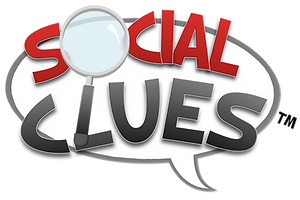









Social Narrative
Social Narrative is an intervention prompting behavioral modification through storytelling and the modeling of targeted behaviors and activities. Social Narrative typically involves a passive story that describes an activity, a discussion of the student’s anticipated behavior and then provides social information to teach the appropriate social behavior. Social Narratives incorporate real world locations and real world behaviors to model the appropriate actions for the student.
Social Clues incorporates this methodology by creating levels based on real-world locations and targeting specific behavioral issues often occurring in those environments. Unlike passive Social Narratives, Social Clues is far more interactive, allowing the player to control how and when they interact with other characters, and teaching appropriate behaviors by making correct choices a requirement in their quest to find lost toys.
Discrete Trial Training
Discrete trial training (DTT) is an instructional approach used to teach skills in a controlled and systematic manner. DTT falls under the larger umbrella of Applied Behavioral Analysis (described above) and is used when a learner needs to learn a skill best taught in small repeated steps.
Each teaching opportunity, or trial, has a definite beginning and end, thus the descriptor discrete trial. Within DTT, the use of prompts and reinforcers are carefully planned and implemented. Positive praise and/or tangible rewards are used to reinforce desired skills or behaviors.
Data is collected and provides teachers and practitioners information about initial skill level, progress and challenges, skill acquisition and maintenance, and generalization of learned skills or behaviors.
In Social Clues every conversation and character interaction is broken into five key, testable steps that are repeated for proper data collection and assessment of progress. Stars are awarded for each step in the conversation process as well as verbal praise from Sherlock. Discrete trials begin and end with the each conversation, and start a new when engaging a new non-player character.
After successfull navigation of a conversation, players are rewarded with reinforcing minigames and ultimately the information necessary to find one of the lost toys they are looking for.
If you would like more information on these and other 'evidence-based practices' please visit the The National Professional Development Center on Autism Spectrum Disorders.
Errorless Learning
Errorless Learning is a method of teaching without any negative stimuli, or in the case of a video game, no failure states. Errorless Learning prevents any chance for incorrect responses, thus decreasing the "learning" of errors. Social Clues incoporates Errorless Learning in two key ways:
-
No wrong choices: Players in Social Clues cannot make wrong choices or mistakes; they are always directed to the right path and the game progresses in a linear fashion so players build confidence and learn only appropriate behaviors
-
No negative feedback: No character in Social Clues ever tells the player they are wrong or that they made bad choices; rather they remain positive and encouraging to motivate continued play.

Social Clues is a hybrid therapy tool and video game. It incorporates some of the most widely used behavioral therapies and is built on a foundation of evidence-based practices.
What are 'evidence-based practices'?
Many interventions exist for autism, but only a few have been proven effective through scientific research; these interventions are called “evidence-based practices.” The learning objectives, and key gameplay mechanics, in Social Clues have been developed from the ground up using core principles of several ‘evidence-based practice’ interventions. Some of these include:
Applied Behavioral Analysis (ABA)
Applied Behavioral Analysis is a teaching and intervention approach used to modify behavior using the cause-and-effect of actions; ie: using varying reinforcements and consequences for changing behaviors.
ABA typically involves the ABC Model (Antecedent, Behavior, Consequence) to study behaviors and define procedures for how to change behavior. Social Clues incorporates the ABC Model as follows:
-
Antecedent: Prompts and triggers are presented by Sherlock and Non-player characters to provide a measurable learning opportunity.
-
Behavior: The player make choices in-game and chooses the behavior they think appropriate while the analytics tracks these choices to learn preferences and trends.
-
Consequence: Sherlock and Non-player characters respond directly to choices, reinforcing appropriate behaviors by either celebrating the correct choices or guiding the player to another.